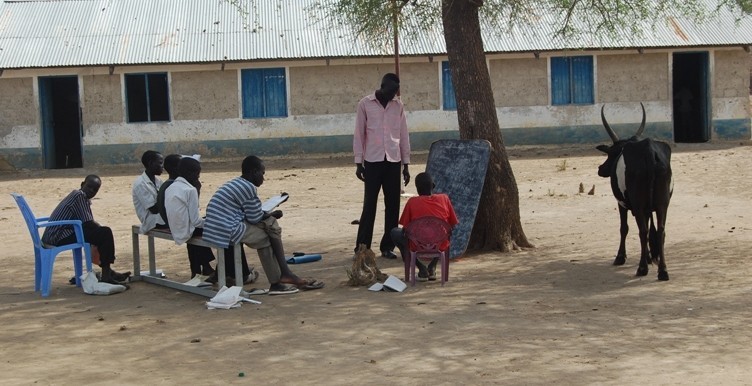Primary eight candidates in Akobo area which lies in an SPLM-IO-held territory say they are angry and upset for missing the Primary Leaving Examinations (PLE) that began across the country on Monday.
Akobo area, which is located in Jonglei State, is a remote and hard-to-reach area in the north-east of South Sudan, close to the border with Ethiopia.
Last week, the National Minister of General Education, Awut Deng Achuil announced that candidates in the SPLM-IO-controlled areas will miss out on the examinations due to security concerns in some parts of Upper Nile and Jonglei States.
The statement was condemned by the SPLM- IO Director for Information and Public Relations, Puok Both Baluong, saying the decision made by the minister was unfortunate.
“Actually, we felt desperate, we had prepared but at the end of the day, we were told that we are will not sit for exams. When that information reached us, we really felt too bad, everyone carried his bag and went back home,” Maker Deng Bangut, a primary eight candidate at Akobo Primary School, told Radio Tamazuj.
Maker, however, expressed optimism that they will still have their exams. He said the candidates are revising their books as they are waiting for alternative examinations from the ministry.
“My advice to all those who missed their exams, let them stay calm and keep on revising, maybe the exams will come before the end of this year or next year,” he said.
Eliza Nyawal, another student at Akobo Primary School, said they were shocked by the announcement made by the education ministry that they will not be doing their exams due to security concerns.
“We were shocked by the announcement that we pupils in Akobo will not sit for PLE exams, we had to prepare and now it’s really difficult because we don’t know when we will be allowed to sit for it since our friends in Juba whom we were supposed to sit together with are busy doing their exams,” she said.
Nyawal said she is unhappy with the recent decision made by the national ministry in Juba denying them the chance of sitting for examinations.
“I am not feeling good because I cannot study for all those years and get prepared for the final exams and from nowhere you say, there are no exams. It’s really bad, I even don’t know how I can advise my friends who have also missed their exams,” Nyawal said.
South Sudan’s civil war has taken a toll on the country’s education system. With the revitalised peace agreement now in place, several partners are trying to support the government to bring children back to school.
“We don’t see any security threats in the area of Akobo. When we got a letter from the Minister of General Education saying that there was a security threat and so the exams will not be there, we replied to them and told them that there was no security threat,” said Tut Kuac Koang, a teacher at Akobo Primary School.
Kuac added, “As we speak, I am a teacher and I have been teaching here, and there is nothing like a security threat. But now I have no option because those who are in Juba have already started their exams, so now we are trying to see how these pupils can have their exams.”
The primary school teacher said all parties have formed a unity government and are working together to implement the revitalised peace agreement.
“Let me tell you this, there is no SPLM-IO and government. They are now under one government, so no SPLM-IO and no government, all parties are the same,” Kuac said.
Edmund Yakani, the Executive Director of the Community Empowerment for Progress Organization (CEPO), which promotes civil society values in South Sudan, says no one has the right to deny children their right to education because it’s one of their basic rights.
“We don’t want to deny children their right to education because it’s one of the basic human rights and there should not be any excuse for us to deny a child the right to school,” Edmund Yakani said. “There should have been an alternative plan, if we are done with a plan for pupils in government-held areas, there should also be a plan for the SPLM-IO areas to make sure pupils there sit for their exams.”
The activist further called on the ministry of education to cooperate with the SPLM-IO leadership in different locations to ensure that alternative exams are marked equally with the initial exams.
David Shearer, the head of the UN mission in South Sudan, urged the national government to distribute the examinations to children in SPLA-IO-held areas.
“I strongly urge for the distribution of the examination papers to children in some of those IO areas that otherwise may miss out of the exams because of insecurity,” David Shearer said. “We stand by as UNMISS to help out if it means that these kids will have a chance to sit for their exams. Every child deserves the very best chance for the future, particularly those who have been working very hard through the year and then may be now denied the chance to sit for their exams. We see this as a critical operation and we will offer any support we might be able to provide.”
In a statement issued on Thursday, the National Ministry of General education announced a date for the conduct of examinations for the pupils who missed out on the initial examinations.
According to the ministry, the examinations will begin on Monday, 15 February.




